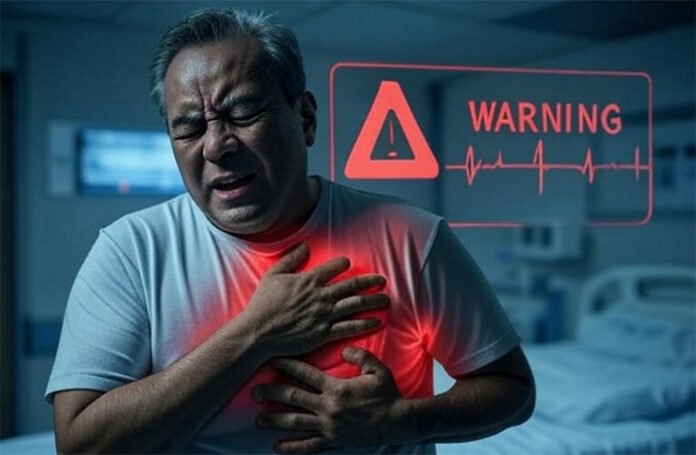
The modern lifestyle, filled with processed food, stress, sedentary routines, and environmental pollutants, is silently damaging one of our most vital organs — the heart. Cases of heart attacks, cardiac arrest, and heart failure are rising at an alarming rate. The tragedy lies in how often the early signs of heart weakness are ignored, dismissed as minor ailments. When addressed early, these signs can lead to timely diagnosis and effective treatment, potentially saving lives.
Below, we delve into the seven most alarming symptoms that may signal a weakening heart. Recognizing these signs promptly can make all the difference.
1. Persistent Chest Pain or Tightness (Angina)
Chest pain remains the most common and unmistakable sign of an underlying heart issue. Known medically as angina, this pain may manifest as:
A heavy or pressing sensation in the center of the chest
A sharp, burning, or squeezing discomfort
Radiating pain to the neck, jaw, shoulders, or arms
Pain that worsens with exertion and eases with rest
If these symptoms are frequent or intensify over time, immediate medical evaluation is crucial. Such signs may point to a blocked coronary artery — a precursor to a heart attack.
2. Swelling in the Feet, Ankles, or Legs
When the heart weakens, it struggles to pump blood efficiently. This leads to fluid retention, especially in the lower extremities. This condition, known as peripheral edema, appears as:
Noticeable puffiness in feet, ankles, and toes
Shiny or stretched skin around the swollen area
Imprints left behind after removing socks or pressing the skin
Chronic swelling is a hallmark of congestive heart failure (CHF). It results from the kidneys retaining sodium and water due to poor circulation, exacerbating the swelling.
3. Unusual Fatigue and Weakness
One of the earliest signs of a failing heart is an overwhelming sense of fatigue. As the heart weakens, it cannot supply enough oxygen-rich blood to meet the body’s demands, leading to:
Constant tiredness even after restful sleep
Weakness during light physical activities like walking or climbing stairs
Difficulty focusing or experiencing brain fog
This form of fatigue is not due to exertion or stress but is linked directly to the heart’s inefficiency in pumping blood.
4. Jaw, Neck, or Throat Pain – Especially in Women
Women often experience subtler heart attack symptoms than men. Instead of sharp chest pain, they might encounter:
A dull ache or tightness in the jaw
Pain that radiates to the neck or throat
Mild discomfort mistaken for muscle strain or tension
These symptoms, often downplayed or misdiagnosed, are critical warning signals of ischemic heart disease or impending myocardial infarction.
5. Indigestion, Nausea, or Stomach Discomfort
Though seemingly unrelated, upper abdominal symptoms may stem from the heart. This includes:
Burning sensation resembling acidity or GERD
Stomach pain or bloating, especially in the epigastric region
Persistent nausea or vomiting, unlinked to food intake
The vagus nerve, which connects the brain, heart, and digestive tract, can cause referred pain to the stomach during heart events. Ignoring these signs can be fatal, especially during silent heart attacks.
6. Shortness of Breath (Dyspnea)
When the heart begins to fail, fluid builds up in the lungs, resulting in difficulty breathing. This condition, called pulmonary congestion, typically presents as:
Breathlessness during minimal exertion
Difficulty breathing while lying flat (orthopnea)
Waking up at night gasping for air (paroxysmal nocturnal dyspnea)
This is a strong indicator of heart failure. Breathlessness should never be taken lightly, especially when it comes on suddenly or worsens over time.
7. Pain or Cramping in the Calf Muscles
Often dismissed as fatigue or dehydration, calf pain may actually signal peripheral artery disease (PAD) — a condition where plaque builds up in arteries, restricting blood flow to limbs. Symptoms include:
Pain or cramps during walking that subside with rest (claudication)
Coldness or numbness in one leg
Slower hair growth or wounds that don’t heal
PAD is closely linked to coronary artery disease and is a red flag that arteries throughout the body, including those feeding the heart, may be compromised.
Who’s at Risk? Recognize the Vulnerable
Certain groups are more prone to developing heart disease and related symptoms, including:
Individuals over age 40
Diabetics and people with high blood pressure
Smokers or those exposed to secondhand smoke
People with high cholesterol or obesity
Those with a family history of cardiovascular disease
Anyone within these risk brackets must remain hyper-aware of early symptoms and undergo regular cardiac screenings.
When to See a Cardiologist
You should consult a heart specialist if you experience:
Any of the above symptoms repeatedly
A sudden change in energy levels or breathing patterns
A family history of early heart disease
Persistent heart palpitations or irregular heartbeat
Delays can cost lives. Many patients dismiss their symptoms until the condition becomes irreversible.
Conclusion: Early Detection Saves Lives
The heart doesn’t suddenly fail — it whispers warnings long before it screams. Recognizing these early symptoms of a weakening heart can prevent heart attacks, reduce hospitalizations, and ultimately save lives. With India witnessing a surge in cardiovascular illnesses, proactive heart health monitoring is not just wise — it’s essential.
Let us remain vigilant, prioritize heart screenings, and adopt heart-friendly lifestyle changes. Because when the heart speaks, we must listen.














